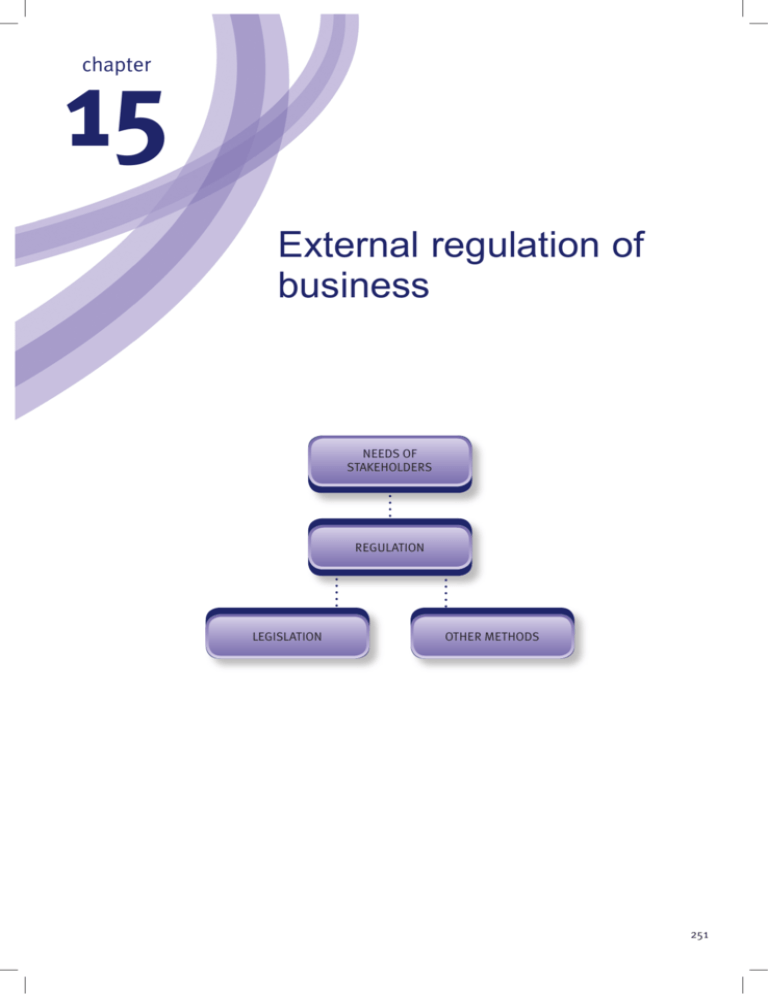External Regulation : What it is
External Regulation: What It Is In today's complex business world, external regulation plays a vital role in shaping the way businesses operate. It refers to the rules, guidelines, and laws imposed by external entities on businesses to ensure compliance and fair practices. This article will provide an in-depth understanding of external regulation, its significance, and how it influences businesses in various sectors. Introduction: External Regulation: A Key Factor in Business Operations In the ever-evolving landscape of business, external regulation serves as a critical mechanism to maintain order, transparency, and fairness. It encompasses a wide range of regulations imposed by government bodies, industry regulators, and professional associations to ensure ethical conduct, protect consumer interests, and foster healthy competition. This article aims to shed light on the concept of external regulation, exploring its implications for businesses across different sectors. 1. Understanding External Regulation: Navigating the Complex Web of Rules and Guidelines External regulation refers to the set of rules and guidelines imposed on businesses by external entities such as government agencies, regulatory bodies, and industry watchdogs. These regulations act as a framework to guide business activities, maintain accountability, and foster a level playing field. They cover a diverse array of areas, including financial reporting, product safety, environmental protection, labor practices, and more. Subheading 1: The Importance of External Regulation 1.1 Ensuring Consumer Protection: Protecting the Interests of the General Public One of the primary objectives of external regulation is to safeguard consumer interests. Regulations such as consumer protection laws, fair trade practices, and anti-discrimination measures play a crucial role in preventing market abuses, deceptive advertising, and unfair business practices. By enforcing these regulations, external entities help maintain a fair and trusted marketplace conducive to healthy economic growth. 1.2 Promoting Ethical Conduct: Setting the Bar for Corporate Behavior External regulations also serve as an ethical compass for businesses, guiding them towards responsible and accountable practices. Regulations pertaining to corporate governance, insider trading, bribery, and corruption ensure that businesses adhere to high ethical standards. By fostering transparency and integrity, external regulation promotes trust and confidence among stakeholders. 1.3 Fostering Healthy Competition: Nurturing a Vibrant Market Economy In an increasingly competitive global economy, external regulation plays a critical role in maintaining fair competition. Regulations governing antitrust and anti-monopoly practices prevent the concentration of power and encourage market competition. This fosters innovation, efficiency, and affordability, benefitting both businesses and consumers alike. Subheading 2: Industries and Regulations 2.1 Financial Sector: Keeping the Wheels of Finance Running Smoothly The financial sector is subject to a myriad of regulations aimed at ensuring stability, transparency, and fair practices. Regulatory bodies like the Securities and Exchange Commission (SEC) in the United States and the Financial Conduct Authority (FCA) in the United Kingdom oversee compliance with regulations governing areas such as banking, investment, securities, and insurance. These regulations help mitigate financial risks, safeguard investor interests, and maintain the integrity of financial markets. 2.2 Health and Pharmaceuticals: Protecting Public Health The health and pharmaceutical industries are heavily regulated to ensure the safety, efficacy, and quality of healthcare products and services. Regulatory agencies such as the Food and Drug Administration (FDA) in the United States and the European Medicines Agency (EMA) in Europe set strict guidelines for drug development, clinical trials, and marketing authorization. These regulations protect public health, prevent fraud, and promote the availability of safe and effective treatments. 2.3 Environmental Protection: Preserving Our Planet for Future Generations With increasing concerns about climate change and environmental degradation, regulations related to environmental protection have gained significant importance. Government agencies and international bodies such as the Environmental Protection Agency (EPA) in the United States and the United Nations Framework Convention on Climate Change (UNFCCC) have developed regulations to mitigate pollution, conserve natural resources, and promote sustainable practices. These regulations aim to create a greener and more sustainable future. Subheading 3: Challenges and Controversies 3.1 Balancing Regulation and Innovation: Striking the Right Equation While external regulation serves many crucial purposes, it also poses challenges, particularly concerning innovation. Stringent regulations and lengthy approval processes can hinder businesses' ability to introduce new products and services. Striking the right balance between regulation and innovation is crucial to ensure sustained economic growth and technological advancement. 3.2 Compliance Costs and Burden: A Challenge for Small Businesses For small businesses with limited resources, compliance costs can be a significant burden. The implementation and monitoring of various regulations require financial investments and administrative efforts. Small business owners often face challenges in navigating the complex regulatory landscape while allocating resources to core business activities. 3.3 Regulatory Capture and Lobbying: The Influence of Special Interests Another challenge associated with external regulation is the potential influence of special interests on the regulatory process. Regulatory capture, where regulatory agencies become subject to the influence of the industries they regulate, can lead to biased regulations that favor certain businesses or hinder fair competition. Lobbying efforts by powerful organizations and industry groups further contribute to this phenomenon, raising questions about the fairness and integrity of the regulatory system. FAQ: Frequently Asked Questions Q: Why is external regulation important for businesses? A: External regulation ensures fair competition, protects consumer interests, and promotes ethical conduct, thereby fostering a trustworthy business environment. Q: How do businesses comply with external regulations? A: Businesses must understand the specific regulations applicable to their industry and adhere to them by implementing appropriate policies, procedures, and reporting mechanisms. Q: What are some consequences of non-compliance with external regulations? A: Non-compliance can result in fines, legal consequences, reputational damage, and loss of consumer trust, among other detrimental effects. Conclusion External regulation is an integral part of the business landscape, promoting fair practices, protecting consumer interests, and fostering a level playing field. By adhering to external regulations, businesses can build trust among stakeholders, operate ethically, and contribute to a sustainable and prosperous economy. While challenges and controversies exist, the effective management of external regulation is crucial for creating a business environment that benefits society as a whole.  Image Source : marinehowto.com
Image Source : marinehowto.com  Image Source : studylib.net
Image Source : studylib.net  Image Source : studylib.net
Image Source : studylib.net  Image Source : education-portal.com
Image Source : education-portal.com  Image Source : studylib.net
Image Source : studylib.net  Image Source : empoweredtoconnect.org
Image Source : empoweredtoconnect.org  Image Source : www.dubberly.com
Image Source : www.dubberly.com  Image Source : www.slideserve.com
Image Source : www.slideserve.com
External Regulation Conversion - Leece-Neville 8MR Alternator - Marine
 Image Source : marinehowto.com
Image Source : marinehowto.com alternator external leece neville marinehowto conversion regulation 8mr support some time pbase
External Regulation Of Immune Response
 Image Source : studylib.net
Image Source : studylib.net External Regulation Of Business
 Image Source : studylib.net
Image Source : studylib.net Self-Determination Theory: Capacity, Strategy & Control Beliefs - Video
regulation external determination theory self beliefs strategy capacity control forces individuals rewards praise punishment motivated extrinsic such when
External Regulation Of Immune Response
 Image Source : studylib.net
Image Source : studylib.net SELF-REGULATION – Empowered To Connect
 Image Source : empoweredtoconnect.org
Image Source : empoweredtoconnect.org 10 Models Of Teaching + Learning
regulation external teaching learning models checking received message students
PPT - The Cell Cycle Control PowerPoint Presentation, Free Download
 Image Source : www.slideserve.com
Image Source : www.slideserve.com external cell cycle control regulation cells ppt powerpoint presentation divide culture
External regulation of immune response. Self-regulation – empowered to connect. 10 models of teaching + learning. External regulation of business. External regulation conversion